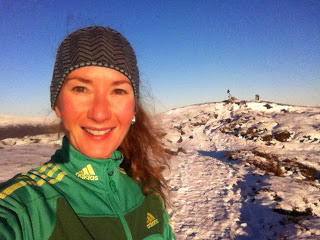I am Sarah Morton, and This is How I Work
 Today I am interviewing Sarah Morton in the “How I Work” series. Sarah is completing her Ph.D at the University of Abertay, Dundee, Scotland. Her current research takes a cross-discipline approach in establishing how design might be used within the adventure sport industry in rural Scotland. The philosophy that underpins all her research is using design to encourage perception change for positive impact.
Today I am interviewing Sarah Morton in the “How I Work” series. Sarah is completing her Ph.D at the University of Abertay, Dundee, Scotland. Her current research takes a cross-discipline approach in establishing how design might be used within the adventure sport industry in rural Scotland. The philosophy that underpins all her research is using design to encourage perception change for positive impact.
Current Job: Ph.D researcher, freelance adventure sport writer, yoga teacher.
Current Location: Chamonix and St. Andrews – I live between the two.
Current mobile device: iPhone
Current computer: MacBook Pro
Can you briefly explain your current situation and research to us?
I am in the process of writing the second draft of my thesis and hope to sit my Viva in the next couple of months. My research focuses on how design could be used within the adventure sport industry in rural Scotland to influence positive changes – including perceptions. I utilised qualitative methods to explore experiences, motivations, opinions etc.
What tools, apps and software are essential to your workflow?
Skype, a recording device, camera, the Internet, Adobe Creative Suite and Microsoft Word.
What does your workspace setup look like?
Most of my research took place in the field – the Highlands of Scotland and the Alps, this has been a wonderful office, however, it has been difficult at times to manage recording conversations and information – this influenced my decision to take an auto-ethnographic approach.
I have an office at the university – this is shared with other Ph.D researchers who are at a similar point in their study.
I also work from home quite a lot – in France I have a wonderful balcony with views toward Mont Blanc, in Scotland I have a nice space with wonderful views also, however, this is my parents home and it can be busy and disruptive at times. I love being able to work at home, as it fits my personality and active lifestyle, however, I do wish my home was in one place and closer to the university – it would be much less disruptive, although having to be so meticulously organised has definitely been a point of personal development!
What is your best advice for productive academic work?
Don’t force yourself to work when you really need a break – the most productive thing I did was taking a month off to go trail running in the Alps – toward the end of the holiday, I felt refreshed and ready to get back into work, desperate to get back to it in fact – this was the complete opposite to how I felt prior to the holiday – I was so focused on my research that I hadn’t realised my progress had slowed. It was thanks to my supervisor for identifying that I needed a break, and encouraging me to take one.
Always make time to read – it fuels your thoughts – right now, while writing my thesis, I have little time to read and although this is often advised so as not to distract or go off in a new direction, I find reading really helps keep my mind active and my thoughts fresh.
Find a great place to work – lots of space, loads of light – your own little sanctuary.
Be selfish – don’t let anyone or anything take you away from your work when you really need to focus on it, people will try – I’ve experienced lots of people who think research is my hobby, purely because I do it in the evenings and the weekends, or whenever really.
Find a good pastime – I took up ultrarunning. Most people think I’m mad, and I probably am, but it provides a daily escape that makes me feel great. Yoga is also really good!
How do you keep an overview of projects and tasks?
Initially I tried to do everything and this was overambitious – I learned to filter out what I didn’t really need to do, and also learned that sometimes I would just have to accept that there were things I wouldn’t have time for. I think research takes over, and it can make you look like a flaky person – I find it hard to keep social commitments or regularly meet with a running or sports club – my research is so fluid, that I just can’t keep a regular schedule.
I keep a paper diary (Filofax) and it is my bible almost, pretty much every task is assigned a date and time, I have lots of notebooks for different things, and I date all my notes, I try to respond to emails every day when I have access to the Internet – I do most things in writing, so I can always refer to them at a later date.
The worst thing to do, is store everything in your head – that’s when it starts to go wrong! Being organised is the key!
Besides phone and computer, do you use other technological tools in work and daily life?
camera
Which skill makes you stand out as an academic?
I’m not sure I personally stand out as an academic – but I think the ability to juggle tasks and remain calm under pressure has helped me greatly, especially since my research and my life is so dispersed. I think being critical while being fair is very important – an understanding of difference, and different areas of interest is very important.
Be super organised and creative, don’t let anyone pull you in a direction you’re not comfortable with, and love your research – there’s no point spending years exploring something you really don’t feel passionate about. I don’t know what impact my research will have, but I know my reasons for pursuing it, are because I wholly believe in it and want it to make a positive change.
What do you listen to when you work?
Nothing specific – I love environmental sounds (I’m partially deaf and can’t concentrate or focus when there is many different sounds for me to identify) – right now, I’m listening to the birds, last night I was listening to my husband chat with his pals and listen to music, in the office – it will be the chatter of the other researchers. I zone out quite a bit as well.
What are you currently reading?
I am reading two books – Phenomenological Research Methods by Clark Moustakas and Sport Ethnography by Robert R Sands.
The hardest thing is to start reading – but then it is great, and helps to clear a lot of thoughts up, to introduce new thoughts and to cement decisions. Finding time can be difficult and it is hard to sustain the momentum, especially with books. Reading journal articles is usually a joy – some are hard work though! I highlight and make notes on the printed pages – this is the easiest way for me to incorporate those elements of literature into my own works. Picture books are definitely my preference – but they don’t always fit well with research!
Are you more of an introvert or extrovert? How does this influence your working habits?
Both – it depends how I feel, how much I have to do, the company I am in. Some days I don’t want to speak to anyone – others I can’t shut up. I react accordingly and it’s great that I can work at home when I don’t feel the office is the best place for me to be.
What’s your sleep routine like?
Good – although I do like a lie in.
What’s your work routine like?
Varies – because my research has been so dispersed I have to be organised, but I can’t always get access to the resources I need to do a particular task. So, I often have to change my plans and work out what I can cover instead of what I wanted to cover. It can be hard to manage and it can be very frustrating – I just try to do something everyday, even a little bit is better than nothing.
What’s the best advice you ever received?
Just keep going.

